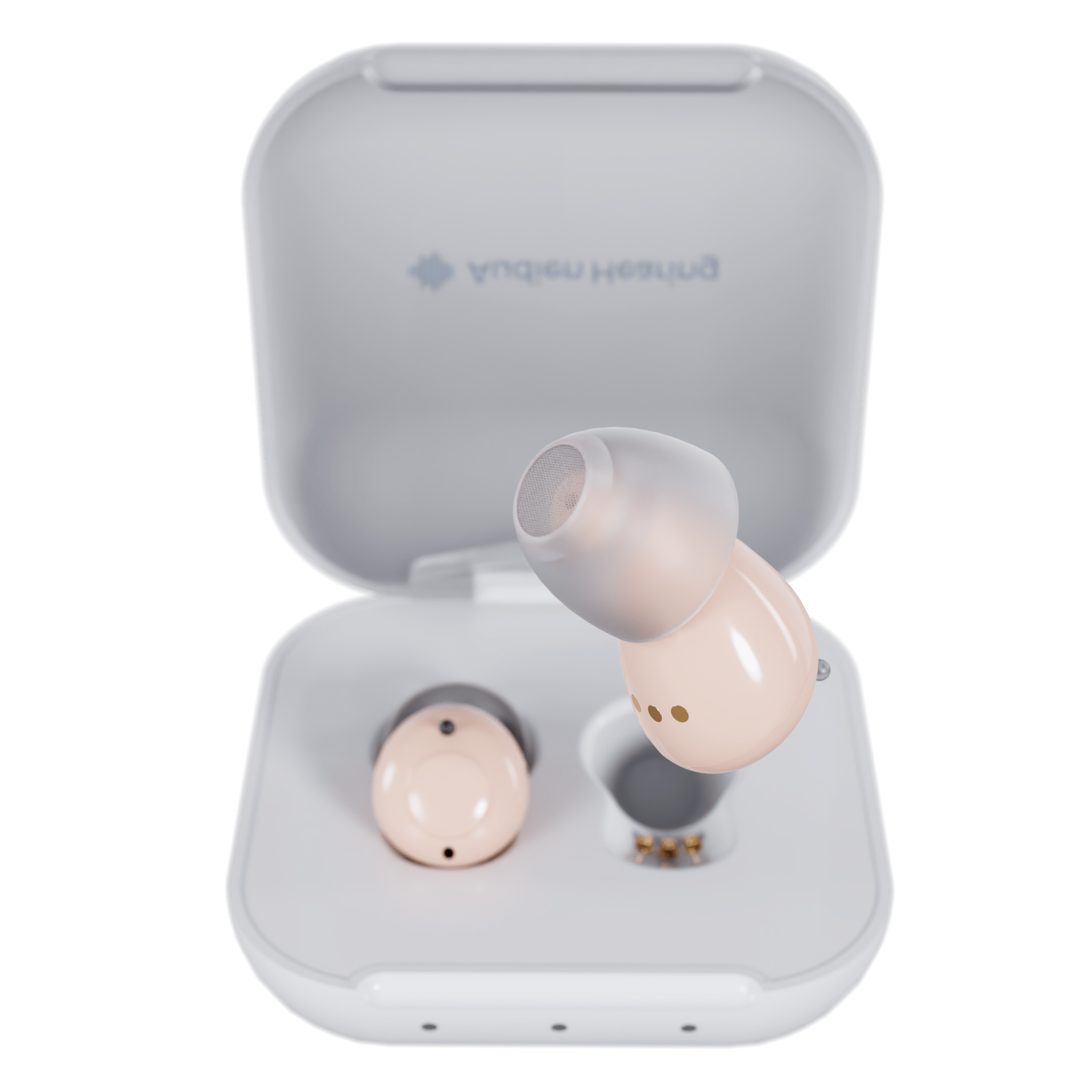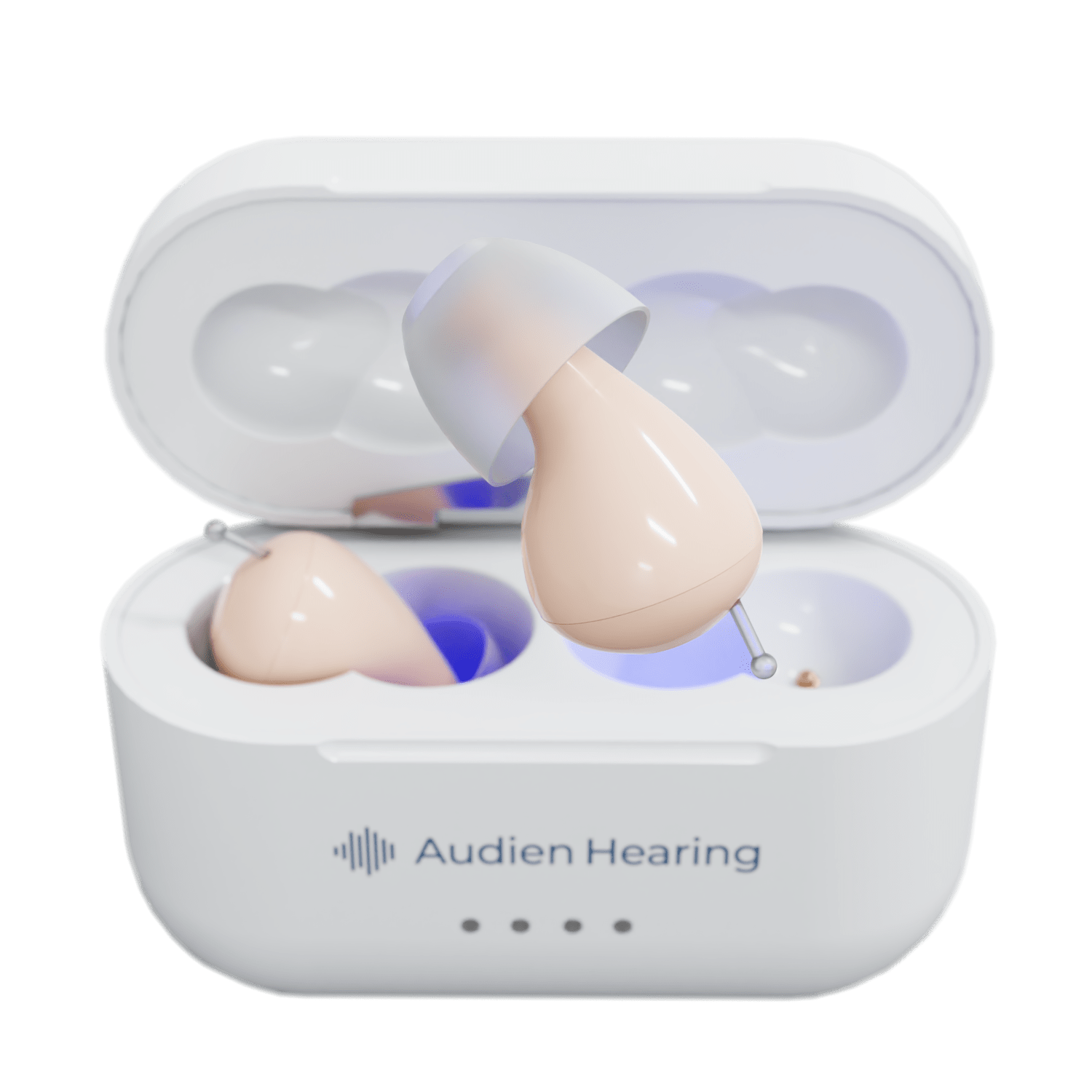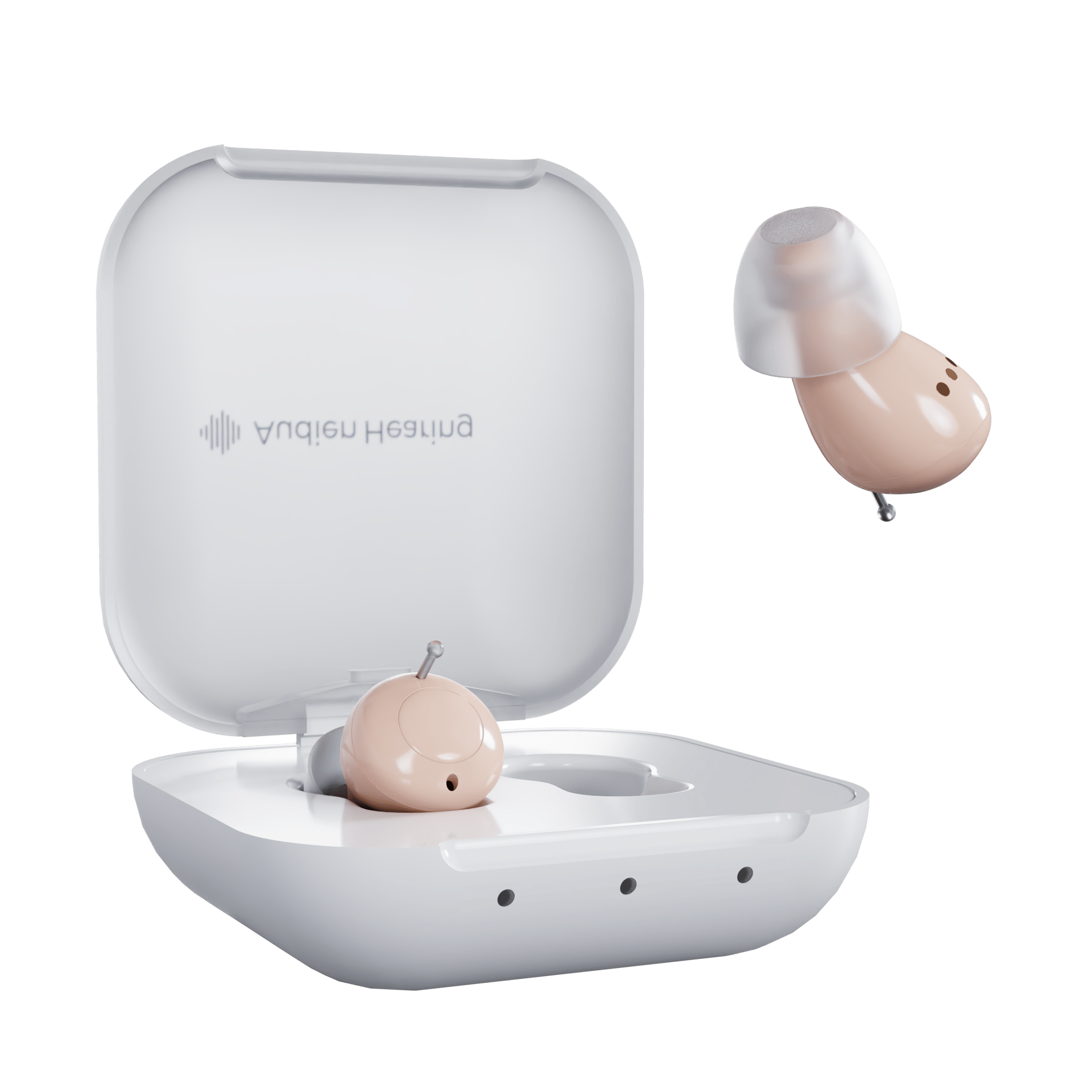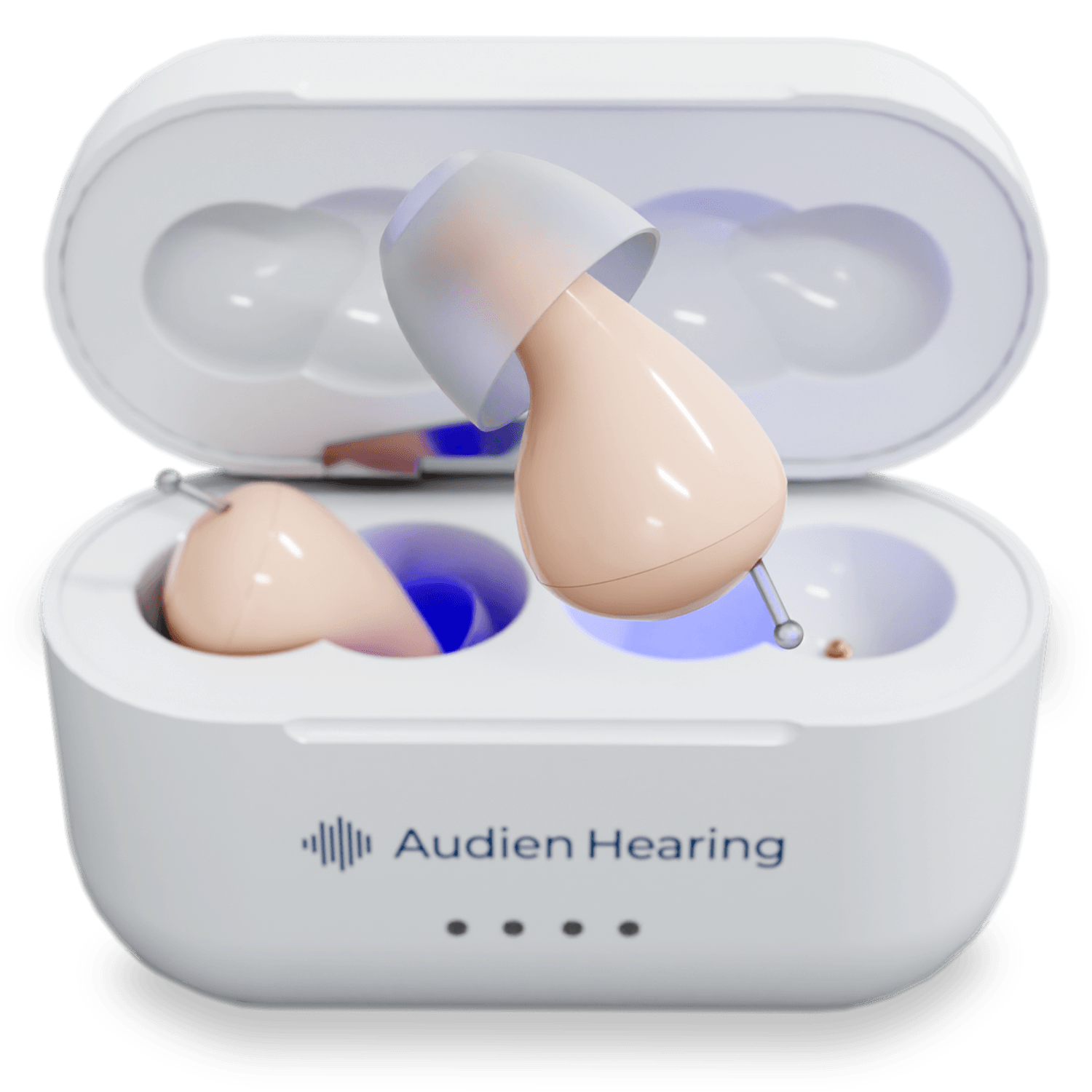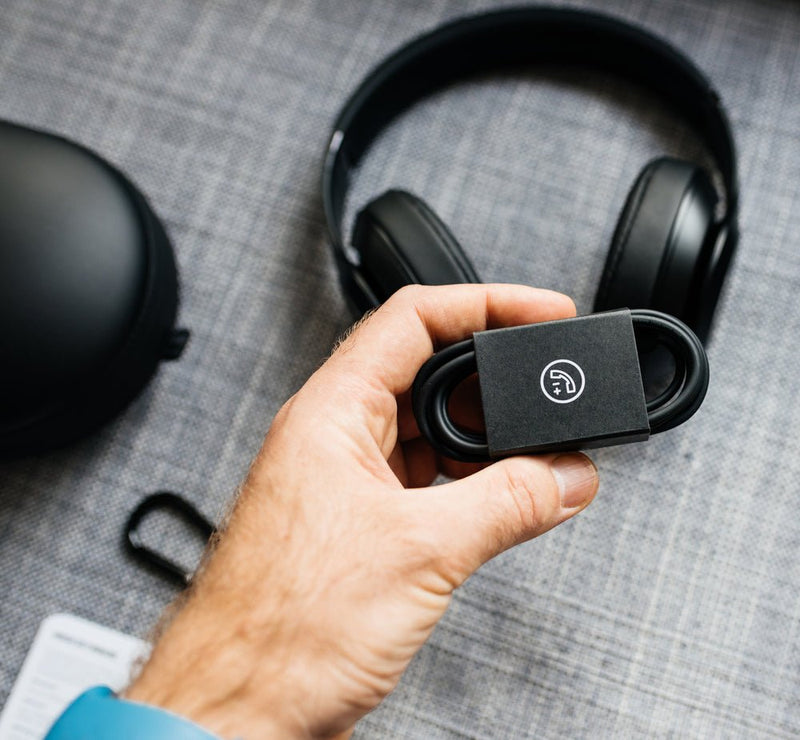
To provide the answers to these questions and more, we've crafted this piece to help you safeguard your hearing while still being able to enjoy the tranquility of noise-canceling headphones either for music, random audio, or silence.
What is Tinnitus?
Tinnitus is a ringing, buzzing, or humming sound or the perception of noise (like hissing) in the ears. It's a common problem that most people can relate to. That said, though most sufferers refer to tinnitus as a condition, it's a symptom of underlying issues in actuality.
Conditions responsible for tinnitus vary. For example, age-related hearing loss, circulatory system disorders, and ear injuries can cause tinnitus.
Suppose you stay in a quiet room and you hear ringing sounds in your ears with no one around, or you hear consistent sounds in your ears when there's no external source of the noise. In that case, that's tinnitus, and you'd want to consult with your doctor to get your hearing checked for an expert diagnosis on the source of your tinnitus.
How Do Noise-canceling Headphones Work?
Most of such headphones utilize state-of-the-art active noise-canceling technology to counteract environmental noise or sounds. Simply put, most noise-canceling headphones reduce surrounding noise using other noise.
This type of headphones can decrease various types of background sounds like the noise of an airplane engine, city traffic noise, and a train’s rumble, amongst others. This is achieved by generating a sound called "anti-noise" that blocks out unwanted environmental noise.
Noise-canceling headphones feature built-in audio-processors capable of detecting sound and producing the exact opposite wave pattern to combat the sound.
However, not every headphone makes use of such active noise-canceling. Some headphones cancel out environmental sounds because they feature a built-in isolating design due to the materials they are made with.
There are three types of noise cancellation headphones available for users:
- Passive noise cancellation headphones
- Active noise cancellation headphones
- Adaptive noise cancellation headphones
These types of noise-canceling headphones are often confused as the same, but they possess some major differences based on how the headphone decreases external noise and the purpose it was created for. So let's see a bit about the differences.
Noise-canceling Headphones – Passive
This type of noise-canceling headphones is the most common. It is usually referred to as noise-isolating headphones. With this type of headphones, the external noises are canceled out. This is achieved via the headphone’s physical features like the materials used, the shape, and design.
The physical features act as a blockade for the external noise by stopping it from reaching the user’s ears. If you've ever seen those big bulky headphones, they are made for noise-isolation purposes as they fully cover the ears of the user with additional padding to block out external noises.
Noise-canceling Headphones - Active
While these headphones also utilize their design and shape to cancel out external noise, they go a bit further and use advanced technology to eliminate environmental noise.
These headphones feature a tiny built-in audio processor capable of detecting and analyzing the sound pattern of external noise and then cancels out the noise by creating a mirror anti-noise signal. The result is that the ambient noise disappears, and this gives you a cleaner sound.
Noise-canceling Headphones - Adaptive
This noise-canceling headphone type is quite recent in terms of the headphones industry. The adaptive technology adjusts the headphone's cancellation strength based on the environmental noise type and level. Its noise-canceling capability is much more powerful when the background sound is louder and less when it is low.
Can Noise-Canceling Headphones Worsen Tinnitus?

There's some degree of evidence on the web from people’s stories regarding noise-canceling headphones and the impact on tinnitus. But there aren't any viable scientific reports currently to solidify such claims.
Most people state that they suffer the symptom of tinnitus after using noise-canceling headphones for a few months. And as they stop the use of noise-canceling headphones, the strange sounds cease. These reports aren't scientific, but there are enough buzz and conversations about this in forums and groups to pick up interest in any relationship between them.
That said, the human brain is an intriguing specimen, and it's capable of picking up various types of background sounds. And when it does, your ears adapt, and most times, you aren't aware of a change.
For example, your home may be silent when everyone is out for the day, and automatically your brain will tune out the soft hum of your air conditioner or fridge in the kitchen. But the moment you begin to use noise-canceling headphones, they're so great at smoothening out such sounds that if you use them for long without playing music, you'll get disorientated. This is the reason most people get dizzy after the first use.
To resist this, the human brain sends a ringing sound to check the ears (just like a concert soundcheck in your head).
So if you wear noise-canceling headphones without playing music or any audio track and have the active noise-canceling switched on, while in a quiet room, you'll discover that you're able to hear sounds in your house that you didn't previously, and they get quite distracting.
In the First Place Can Frequent Use of Noise-canceling Headphones Cause Tinnitus?
When tinnitus occurs, it's often due to you getting exposed to loud sounds or some level of hearing loss. Does this mean your headphones are the cause of it?
That's very likely, especially if you consistently use them to listen to music with the volume turned up. The louder and longer you use your headphones to listen to music (this can be normal or noise-canceling headphones), the more you're likely to encounter hearing loss.
Speak to an audiologist, and they'll inform you that it isn't the earbuds or headphones you use that's the problem but the audio volume of the headphones or earbuds that you're using to listen that is responsible.
Even in short, quick bursts, loud sounds can cause a tremendous amount of damage to your hearing. If you get tinnitus, it's possibly because you're playing your audio for too long and too loud. This is regardless of the kind of headphones you use. Any one of them will eventually get your hearing damaged if you neglect the proper caution required when using them.
So how do you get the best out of noise-canceling headphones without causing damage to your ears? We'll see that in a bit.
Too much Exposure to Loud Noises Can Cause Hearing Loss
For decades tinnitus was a lot more common in the elderly (that's, people ages 55 and above). This is because as humans age, hearing loss sometimes comes along the way. And when hearing loss begins, so does tinnitus. However, these days with the rave of headphones around all of us, middle age and young people expose themselves to loud sounds consistently, which leads to hearing loss for people in the younger age brackets.
That said, it's not just headphones. For young people, the world is a lot louder. Gym classes are louder. Clubs are louder. Concerts are louder as well. Such constant exposure to loud sounds is the kind of environment young people encounter nowadays. And when you have such loud sounds blasting into your ears consistently, you can very quickly affect your inner ear structure.
For example, the American Osteopathic Association states that 1 in every five young adults suffers from hearing loss, which is 30% greater than it was decades ago (the 1980s to 1990s). There's also research from the World Health Organisation that shows about 1.1 billion young adults at risk of hearing loss because they listen to loud audio on their devices consistently and attend noisy and loud events.
Audiologists also report a rise in the frequency of visits from young patients and state headphones as primary causes. However, it isn't the headphones that are causing the problem but how people utilize them.
Years ago, headphones were not as common as they are now. And one of the things to keep in mind is that many people who use regular headphones aren't that loud at low volumes, increasing the volume to drown out the surrounding sounds that interfere with their audio. This is why most people opt for noise-canceling headphones, as they permit the user to enjoy the sounds they intend to hear without increasing the volume to suppress environmental sounds.
So it's obvious that wearing headphones and listening to audio at high volumes for extended periods will result in poor hearing. And hearing loss is an underlying cause of tinnitus.
Sometimes this kind of tinnitus may be temporary if you are just exposed to loud volumes for brief periods, like after attending a concert. It may also occur after you listen to audio on your headphones at high volumes and reduce or go away after some time but regardless, it will result in permanent damage to your hair cells within your ears.
These cells control your hearing ability, and if they are affected negatively, it will cut down your ability to hear. This isn't an immediate process, but these cells are damaged over time, and the loss of hearing starts gradually. It isn't sudden radio silence.
There is currently ongoing research on how these hair cells within your ears can be regrown. Still, regardless of the outcome, it's much better to focus on keeping your ears safe, and this can be done by only using your noise-canceling headphones at the recommended volumes.
As you limit the frequency, length, and volume when listening to audio with your headphones, you can protect your ears and still enjoy a great audio experience.
The damaging effects of noise exposure are dependent on how often, how long, and how loud you listen. And the general rule of thumb is that it isn't safe to listen to noise or sounds at 85 decibels for over 8 hours per day.
This is because the sound level is about the same as city traffic. If you turn it up to 100 decibels (like a metal concert), you can cause damage to your hearing in only 15 minutes of using your headphones.
So what is the recommendation with regards to noise-canceling headphones as well as other types? Limit the amount of time you use them to no longer than 1 hour at a go to give an hour break in between. This is to let your ears rest.
How can I Avoid Common Mistakes Made When Using Headphones?

Regardless of whether you're using earbuds, noise-canceling headphones, or regular headphones, all kinds of headphones can lead to hearing loss if used with caution.
This is irrespective of whether they are cheap or expensive; it makes no difference.
So to help you, here are a few tips that will help safeguard your hearing and make your listening pleasurable with your headphones.
Use Noise-canceling Headphones when in Noisy Environments
When you use regular headphones in noisy environments, you have to turn up the volume extra loud to hear what you are listening to, but with noise-canceling headphones, you can counterbalance the noise in your surroundings. This keeps you from playing around with the volume whenever the surrounding noise increases.
Keep Track of How Loud and How Long
A great rule to follow is to keep your volume around 60% of the maximum and not go beyond listening for more than 90 minutes daily.
It can be hard work keeping track of time, especially when you are into the audio you are listening to, but some of the noise-canceling headphone models have certain features built-in that can show you how loud and how long you've been listening.
This makes it easy to adjust the volume to a level that is safe for your hearing.
Use Both Sides of your Headphones at Once
Headphones are made to function like your ears. That is, they work in unison to create a unified sound. So if you use just one side (like if you're sharing with a colleague while on transit), it won't sound as loud. And when you increase the volume to hear better, you'll be blasting the single ear with a harmful volume level.
Avoid Using Headphones When You Need to Give Rapt Attention
Even though listening to audio tracks with your headphones while jogging or riding a bike is common, it is recommended that you don't do this for other reasons beyond hearing loss.
Except you're safely using stationary gym equipment, it's very dangerous when you're unable to hear what's going on around you, especially when jogging.
This goes without saying, but you also want to avoid wearing headphones while you're driving. Aside from being illegal and that for a good reason, you need to hear everything around you and stay alert so you can drive safely. Try to use headphones that allow you to hear outside noises while listening to your audio.
How to Prevent Tinnitus for Noise-canceling Headphone Users
To prevent tinnitus, you don't have to stay away from headphones of any kind, including noise-canceling headphones. However, it's important to know that whatever you put in or over your ears to listen to audio must be used with the necessary cautionary measures to safeguard your ears from exposure to loud sounds. To achieve this:
Cut-down the Amount of Time You are Exposed to Loud Noises
This isn't exclusive to your noise-canceling headphones. When you are attending a concert or increasing your home stereo volume, try to keep such times to the barest minimum. And avoid exposing your ears to any other form of loud noise consistently if possible.
Have Regular Breaks from Loud Noises
Sometimes there is no way you can get around exposure to loud sounds. In such scenarios, you can ensure that you take breaks from the loud noises around you so your ears can have time to recover.
Protect Yourself from Noise
Suppose you have to be in a noisy environment. In that case, whether attending a concert or your day job demands that you work around loud machinery, you can protect your ears from these sounds by wearing head protection that'll help cut down your exposure to the hurtful sounds.
Earplugs are an excellent option for such scenarios as some kind of earplugs balance out the noise, so you can still hear it without damaging your ears.
How does it relate to noise-canceling headphones? Well, if your ears are regularly exposed to loud noises, and you use noise-canceling headphones even for an hour, you can easily get tinnitus because much damage has already been done.
Restrict Your Alcohol Intake
Alcohol makes the hair cells in your ears more susceptible to damage from loud sounds. This is also true for dehydration. So if you're at an event or party dancing to loud music, you should balance your intake of alcoholic beverages with enough water.
Place a Limit on the Volume of Your Audio and Time When Using Your Noise-canceling Headphones
When you use your noise-canceling headphones, make sure that you take the necessary precautions by placing time limits on the length of use and restrictions on how loud you increase the volume.
Earbuds usually have an audio signal that you can elevate by 9 decibels, so go for big headphones that cover your ears. And when listening to your audio, stick to 60% of the total volume range and limit the time you do this to just one hour every day. But if that's not possible, take breaks in between and listen every other hour.
However, noise-canceling headphones are the best options as you can use them for much longer at lower decibel levels.
Visit the Doctor
Staying concerned about the health of your ear is crucial, so if you are regularly exposed to loud noises via your noise-canceling headphones, where you work, or your lifestyle, especially when you notice symptoms of tinnitus, then you need to schedule a visit with your doctor to have your ears checked out.
Can Noise-canceling Headphones Ease Your Tinnitus?
Loud noises can trigger tinnitus, so sufferers of the condition can use noise-canceling headphones to help ease the tinnitus that might occur later in the day.
Some individuals may be on a flight where they have to hear the persistent engine sound. By eliminating the loud environmental noise, the sufferer can ensure that the tinnitus sound that occurs later won't be too bad. So noise-canceling headphones can be seen as a tinnitus preventive measure. This can or not work for you.
It is advisable that when using noise-canceling headphones in a bid to prevent tinnitus from occurring later on in the day due to loud sound exposure that you listen to an audio track. This is because simply placing a noise-canceling headphone over your ears may make the quietness that results quite uncomfortable and can even amplify the tinnitus sound.
Most tinnitus patients state that the condition is easier to manage if they're able to hear some form of audio or have background noise, as the phantom sounds are hard to ignore if there is no ambient noise getting through the noise-canceling headphones.
Are Headphones Advisable to Use with Tinnitus?
You can use noise-canceling headphones if you are suffering from tinnitus, and yes, even expert advice recommends patients to wear headphones.
But people should seek medical advice on the right kind of headphones to use. That said, there is a ton of information on the various tinnitus forums online where individuals talk about how they manage tinnitus while listening to audio and music they love.
Also, as we have just seen, noise-canceling headphones can reduce the effect of tinnitus for patients by decreasing the loud noises that cause later episodes. Noise-canceling headphones can also prevent some of the underlying causes of tinnitus, like hearing loss, by eliminating users’ need to increase the volume.
Conclusion
The conclusion is simple: does noise-canceling headphones help ease or cause tinnitus? It all depends on how it is used.
If you intend to safeguard your hearing, you may want to go for the noise-canceling headphones to get sound clarity without increasing the volume so loud that it drowns out all the environmental sounds as loud sounds can cause tinnitus.
However, making the mistake of using noise-canceling headphones to listen to loud music for extended periods will cause damage to your ears. But suppose you want to use them not just to listen to audio but also to shield your ears from loud noise in your environment to prevent tinnitus surfacing later on in the day. In that case, noise-canceling headphones work great in helping to ease and to avoid tinnitus.
So, in the end, it's all about how and when you use noise-canceling headphones that determine if they are helpful or damaging to your ears.
